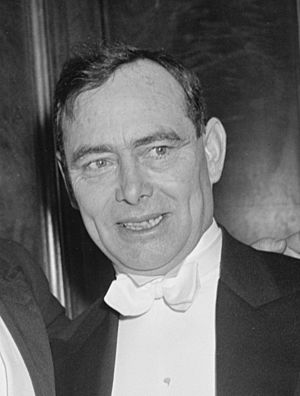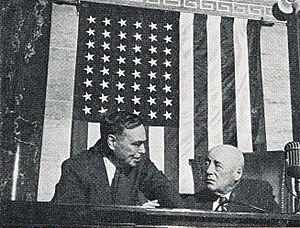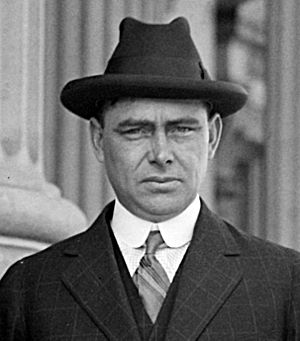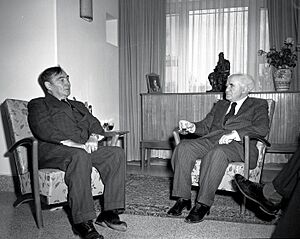Joseph W. Martin Jr. facts for kids
Quick facts for kids
Joseph W. Martin Jr.
|
|
|---|---|

Martin in 1939
|
|
| 44th Speaker of the United States House of Representatives | |
| In office January 3, 1953 – January 3, 1955 |
|
| Preceded by | Sam Rayburn |
| Succeeded by | Sam Rayburn |
| In office January 3, 1947 – January 3, 1949 |
|
| Preceded by | Sam Rayburn |
| Succeeded by | Sam Rayburn |
| House Minority Leader | |
| In office January 3, 1955 – January 3, 1959 |
|
| Deputy | Leslie C. Arends |
| Preceded by | Sam Rayburn |
| Succeeded by | Charles Halleck |
| In office January 3, 1949 – January 3, 1953 |
|
| Deputy | Leslie C. Arends |
| Preceded by | Sam Rayburn |
| Succeeded by | Sam Rayburn |
| In office January 3, 1939 – January 3, 1947 |
|
| Deputy | Harry Englebright Leslie C. Arends |
| Preceded by | Bertrand Snell |
| Succeeded by | Sam Rayburn |
| Chair of the Republican National Committee | |
| In office July 8, 1940 – December 7, 1942 |
|
| Preceded by | John Hamilton |
| Succeeded by | Harrison E. Spangler |
| Leader of the House Republican Conference |
|
| In office January 3, 1939 – January 3, 1959 |
|
| Deputy | Harry Englebright Leslie C. Arends Charles Halleck Leslie C. Arends Charles Halleck Leslie C. Arends |
| Preceded by | Bertrand Snell |
| Succeeded by | Charles Halleck |
| Member of the U.S. House of Representatives from Massachusetts |
|
| In office March 4, 1925 – January 3, 1967 |
|
| Preceded by | Robert M. Leach |
| Succeeded by | Margaret Heckler |
| Constituency | 15th district (1925–1933) 14th district (1933–1963) 10th district (1963–1967) |
| Personal details | |
| Born |
Joseph William Martin Jr.
November 3, 1884 North Attleborough, Massachusetts, U.S. |
| Died | March 6, 1968 (aged 83) Hollywood, Florida, U.S. |
| Political party | Republican |
Joseph William Martin Jr. (born November 3, 1884 – died March 6, 1968) was an important American politician. He was a member of the Republican Party. He served as the Speaker of the U.S. House of Representatives two times. These terms were from 1947 to 1949 and from 1953 to 1955.
Martin represented his hometown area in Massachusetts in the U.S. House of Representatives. He served there from 1925 to 1967. He was also the leader of the House Republicans from 1939 to 1959. He lost this leadership role after his party did not do well in the 1958 elections. He was the only Republican Speaker of the House for a long time, from 1931 to 1995.
Early in his career, Martin worked as a newspaper editor. He also served in both parts of the state government in Massachusetts. He was elected to the U.S. House of Representatives in 1924. He became the House Minority Leader after the 1938 elections.
He also led the Republican National Committee from 1940 to 1942. This was at the request of Wendell Willkie, who was the Republican candidate for president in 1940. Martin led five Republican National Conventions. He was often involved in choosing presidential candidates.
After the 1952 election, Martin supported President Dwight D. Eisenhower's foreign policy. Martin lost his leadership job after the 1958 elections. His deputy, Charles A. Halleck, took over. Martin continued to serve in Congress until 1966. He lost his re-election bid to Margaret Heckler. Martin passed away in Hollywood, Florida in 1968.
Early Life and Education
Joseph Martin was born in North Attleborough, Massachusetts. His mother was Catherine Keating and his father was Joseph William Martin, a blacksmith. His mother was born in Ireland and came to the U.S. in 1878. She met Martin Sr. in Newark, New Jersey, and they married in 1882.
Martin Jr. went to North Attleborough High School. He played shortstop on the school's baseball team. He also played semi-professional baseball and earned money from it. Martin worked for the Evening Chronicle newspaper. He started as a delivery boy and later became the managing editor and publisher.
In his book, My First Fifty Years in Politics, Martin described his hometown. He said it was a smaller, friendlier place back then. He felt people were more willing to help young people start out. He noted that people seemed colder later on.
Martin had planned to go to Dartmouth College. However, he stayed with his newspaper job instead. He wanted to help his parents by supporting his younger brothers through college. He used most of his salary as a state senator to help his brother Edward attend Dartmouth.
Political Career
Martin served in the Massachusetts House of Representatives from 1912 to 1914. He then served in the Massachusetts Senate from 1914 to 1917. He was elected to the United States House of Representatives in 1924. He served there for a very long time, until 1967. In 1920, he was a presidential elector.
Martin was the chairman of the Republican National Committee from 1940 to 1942. He was asked to take this job by Wendell Willkie. Willkie's nomination for president was a big surprise to Martin. During the New Deal era, Martin was a strong opponent of President Franklin D. Roosevelt's policies. He also disagreed with Roosevelt's international views on foreign affairs. However, Martin did support some New Deal ideas, like setting a minimum wage.
In the 1940 presidential campaign, President Roosevelt famously criticized "Martin, Barton and Fish." This referred to Joseph Martin and two other Republican House members.
Martin won re-election in 1946 against Martha Sharp. During his campaign, he called her a "little girl."
After 1952, Martin became part of the more moderate group of Republicans. He supported President Dwight D. Eisenhower's international policies. This included supporting foreign aid. He also backed federal money for building schools. He even supported Lyndon B. Johnson's Economic Opportunity Act of 1964.
When Martin first entered Congress, Massachusetts was a Republican state. Over the years, the Democrats became much stronger. Despite this, Martin managed to keep his House seat. This was even with changes to the voting districts.
In 1960, Martin published his autobiography, My First Fifty Years in Politics. It was a detailed account of his long career. Martin was also the publisher of The Evening Chronicle newspaper. After he died, it merged with another paper and became The Sun Chronicle.
Leadership Roles

Martin was chosen as House Minority Leader after the Republicans gained seats in the 1938 elections. He served as Speaker of the House two separate times. These were from 1947 to 1949 and from 1953 to 1955.
These terms happened when Republicans had a small majority in the House. Martin's two terms as Speaker were between terms served by Sam Rayburn. Rayburn was a Democrat from Texas. Martin and Rayburn had a good personal friendship.
In 1948, Martin traveled with presidential candidate Thomas E. Dewey. Martin's mother told Dewey that he seemed too confident. She warned him not to take victory for granted. Dewey later admitted to Martin that he found it easier to speak for other candidates than for himself.
A very important moment in Martin's career happened in April 1951. He read a letter in Congress from General Douglas MacArthur. MacArthur was leading U.S. troops in the Korean War. President Harry S. Truman wanted to negotiate for peace. MacArthur's letter strongly criticized the president's policy.
Martin hoped sharing the letter would help MacArthur's case. Instead, it caused a big political argument. Six days after Martin read the letter, Truman fired MacArthur.
Even after this, Martin and MacArthur remained friends. Martin invited the general to give a famous speech to Congress. This speech was known as the "Old Soldiers Never Die" speech. In 1952, Martin encouraged MacArthur to run for president. However, MacArthur supported Robert A. Taft.
As the leader of House Republicans, Martin led the Republican National Convention five times. This was between 1940 and 1956. In 1940, he helped choose Charles L. McNary as Wendell Willkie's running mate. Martin's most debated role was at the 1952 Republican National Convention. Some people thought his decisions helped Dwight D. Eisenhower win the nomination over Taft.
Before the 1952 elections, Martin went to Hot Springs, Arkansas. He attended a Republican meeting there. The goal was to find ways to make the party stronger in the South. Republicans won in several Southern states that year.
Martin was in the Speaker's chair on March 1, 1954. On that day, four people from Puerto Rico opened fire in the House. Five Representatives were hurt. Martin quickly declared a recess and found cover.
Martin was the last Republican Speaker of the House for 40 years. Newt Gingrich became Speaker in 1995. Martin stayed as a regular member of the House after losing his leadership role in 1958. Eight years later, in 1966, he lost his seat in the Republican primary. He was defeated by Margaret Heckler, who was much younger.
Martin voted for important civil rights laws. These included the Civil Rights Act of 1957, Civil Rights Act of 1960, and Civil Rights Act of 1964. He also supported the 24th Amendment and the Voting Rights Act of 1965.
Martin passed away in Hollywood, Florida, on March 6, 1968.
Legacy and Recognition
Today, in his hometown of North Attleborough, an elementary school is named after him. It is called the Joseph W. Martin Jr. Elementary School. The Joseph W. Martin Institute for Law and Society also bears his name. This institute holds his personal papers and is located at Stonehill College in North Easton, Massachusetts.
In 2007, the North Attleborough High School Alumni Association created an award. It is called the Joseph W. Martin Jr. Distinguished Alumni Award. This award recognizes former students of the high school who have achieved great things.
See also
- 1915 Massachusetts legislature
- 1916 Massachusetts legislature
- 1917 Massachusetts legislature



